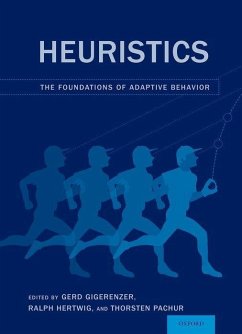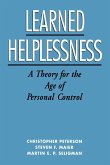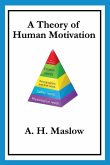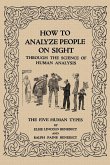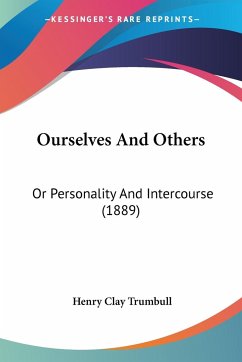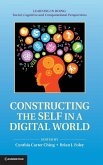- Broschiertes Buch
- Merkliste
- Auf die Merkliste
- Bewerten Bewerten
- Teilen
- Produkt teilen
- Produkterinnerung
- Produkterinnerung
How do people make decisions when time is limited, information unreliable, and the future uncertain? Based on the work of Nobel laureate Herbert Simon and with the help of colleagues around the world, the Adaptive Behavior and Cognition (ABC) Group at the Max Planck Institute for Human Development in Berlin has developed a research program on simple heuristics, also known as fast and frugal heuristics. In the social sciences, heuristics have been believed to be generally inferior to complex methods for inference, or even irrational. Although this may be true in "small worlds" where everything…mehr
Andere Kunden interessierten sich auch für
![Self and Identity Self and Identity]() Richard D. Ashmore / Lee Jussim (eds.)Self and Identity97,99 €
Richard D. Ashmore / Lee Jussim (eds.)Self and Identity97,99 €![Learned Helplessness Learned Helplessness]() Christopher PetersenLearned Helplessness59,99 €
Christopher PetersenLearned Helplessness59,99 €![A Theory of Human Motivation A Theory of Human Motivation]() Abraham H. MaslowA Theory of Human Motivation10,99 €
Abraham H. MaslowA Theory of Human Motivation10,99 €![How to Analyze People on Sight How to Analyze People on Sight]() Elsie Lincoln BenedictHow to Analyze People on Sight17,99 €
Elsie Lincoln BenedictHow to Analyze People on Sight17,99 €![Altruistic Personality Altruistic Personality]() Samuel P. OlinerAltruistic Personality29,99 €
Samuel P. OlinerAltruistic Personality29,99 €![Ourselves And Others Ourselves And Others]() Henry Clay TrumbullOurselves And Others30,99 €
Henry Clay TrumbullOurselves And Others30,99 €![Constructing the Self in a Digital World Constructing the Self in a Digital World]() Constructing the Self in a Digital World99,99 €
Constructing the Self in a Digital World99,99 €-
-
-
How do people make decisions when time is limited, information unreliable, and the future uncertain? Based on the work of Nobel laureate Herbert Simon and with the help of colleagues around the world, the Adaptive Behavior and Cognition (ABC) Group at the Max Planck Institute for Human Development in Berlin has developed a research program on simple heuristics, also known as fast and frugal heuristics. In the social sciences, heuristics have been believed to be generally inferior to complex methods for inference, or even irrational. Although this may be true in "small worlds" where everything is known for certain, we show that in the actual world in which we live, full of uncertainties and surprises, heuristics are indispensable and often more accurate than complex methods. Contrary to a deeply entrenched belief, complex problems do not necessitate complex computations. Less can be more. Simple heuristics exploit the information structure of the environment, and thus embody ecological rather than logical rationality. Simon (1999) applauded this new program as a "revolution in cognitive science, striking a great blow for sanity in the approach to human rationality."
Hinweis: Dieser Artikel kann nur an eine deutsche Lieferadresse ausgeliefert werden.
Hinweis: Dieser Artikel kann nur an eine deutsche Lieferadresse ausgeliefert werden.
Produktdetails
- Produktdetails
- Verlag: Oxford University Press
- Seitenzahl: 882
- Erscheinungstermin: 1. Dezember 2015
- Englisch
- Abmessung: 254mm x 178mm x 47mm
- Gewicht: 1623g
- ISBN-13: 9780190494629
- ISBN-10: 019049462X
- Artikelnr.: 47868053
- Herstellerkennzeichnung
- Libri GmbH
- Europaallee 1
- 36244 Bad Hersfeld
- gpsr@libri.de
- Verlag: Oxford University Press
- Seitenzahl: 882
- Erscheinungstermin: 1. Dezember 2015
- Englisch
- Abmessung: 254mm x 178mm x 47mm
- Gewicht: 1623g
- ISBN-13: 9780190494629
- ISBN-10: 019049462X
- Artikelnr.: 47868053
- Herstellerkennzeichnung
- Libri GmbH
- Europaallee 1
- 36244 Bad Hersfeld
- gpsr@libri.de
Gerd Gigerenzer is Director of the Center for Adaptive Behavior and Cognition at the Max Planck Institute for Human Development in Berlin, and former Professor of Psychology at the University of Chicago. He won the AAAS Prize for the best article in the behavioral sciences and the Association of American Publishers Prize for the best book in the social and behavioral sciences. His recent books include Rationality for Mortals, Gut Feelings, and Risk Savvy . Ralph Hertwig is Director of the Center for Adaptive Rationality at the Max Planck Institute for Human Development in Berlin. His research investigates how individuals and groups juggle the simultaneous demands of uncertainty, data scarcity, and limits in cognitive resources when making decisions. He was previously Chair of Cognitive and Decision Sciences and Dean of the Faculty of Psychology at the University of Basel, and he is a recipient of the Heinz Heckhausen Young Scientist Prize.
* Introduction
* List of Contributors
* Appetizer
* 1. Homo heuristicus: Why Biased Minds Make Better Inferences.
* Gerd Gigerenzer, and Henry Brighton
* Part I: Theory
* Opening the adaptive toolbox
* 2. Reasoning the Fast and Frugal Way: Models of Bounded Rationality.
* Gerd Gigerenzer, and Daniel G. Goldstein
* 3. Models of Ecological Rationality: The Recognition Heuristic.
* Daniel Goldstein and Gerd Gigerenzer
* 4. How Forgetting Aids Heuristic Inference.
* Lael J. Schooler and R. Hertwig
* 5. Simple Heuristics and Rules of Thumb: Where Psychologists and
Behavioral Biologists Might Meet.
* John M.C. Hutchinson and Gerd Gigerenzer
* 6. Naive and Yet Enlightened: From Natural Frequencies to Fast and
Frugal Decision Trees.
* Laura Martignon, Oliver Vitouch, Masinori Takezawa, and Malcolm R.
Forster
* 7. The Priority Heuristic: Making Choices without Trade-Offs.
* Eduard Brandstätter, Gerd Gigerenzer, and Ralph Hertwig
* 8. One-Reason Decision making: Modeling Violations of Expected
Utility Theory.
* Konstantinos V. Katsikopoulos and Gerd Gigerenzer
* 9. The Similarity Heuristic.
* Daniel Read and Yael Grushka-Cockayne
* 10. Hindsight Bias: A By-Product of Knowledge Updating?
* Ulrich Hoffrage, Ralph Hertwig, and Gerd Gigerenzer
* How are heuristics selected?
* 11. SSL: A Theory of How People Learn to Select Strategies.
* Jõrg Rieskamp and Philipp E. Otto
* Part II: Tests
* When do heuristics work?
* 12. Fast, Frugal, and Fit: Simple Heuristics for Paired Comparison.
* Laura Martignon and Ulrich Hoffrage
* 13. Heuristic and Linear Lodels of Judgment: Matching Rules and
Environments.
* Robin M. Hogarth and Natalia Karelaia
* 14. Categorization with Limited Resources: A Family of Simple
Heuristics.
* Laura Martignon, Konstantinos V. Katsikopoulo, and Jan K. Woike
* 15. A Signal Detection Analysis of the Recognition Heuristic.
* Timothy J. Pleskac
* 16. The Relative Success of Recognition-Based Iinference in
Multichoice Decisions.
* Rachel McCloy, C. Philip Beaman, and T. Smith
* When do people rely on one good reason?
* 17. The Quest for Take-the-Best.
* Arndt Bröder
* 18. Empirical Tests of a Fast and Frugal Heuristic: Not Everyone
"Takes-the-Best. "
* Ben R. Newell, Nicola J. Weston, and David R. Shanks
* 19. A Response-Time Approach to Comparing Generalized Rational and
Take-the-Best Models of Decision Making.
* F. Bryan Bergert and Robert M. Nosofsky
* 20. Sequential Processing of Cues in Memory-Based Multi-Attribute
Decisions.
* Arndt Bröder and Wolfgang Gaissmaier
* 21. Does Imitation Benefit Cue-OrderLlearning?
* Rocio Garcia-Retamero, Masanori Takezawa, and Gerd Gigerenzer
* 22. The Aging Decision Maker: Cognitive Aging and the Adaptive
Selection of Decision Strategies.
* Rui Mata, Lael J. Schooler, and Jörg Rieskamp
* When do people rely on name recognition?
* 23. On the Psychology of the Recognition Heuristic: Retrieval Primacy
as a Key Determinant of its Use.
* Thorsten Pachur and Ralph Hertwig
* 24. The Recognition Heuristic in Memory-Based Inference: Is
Recognition a Non-Compensatory Cue?
* Thorsten Pachur, Arndt Bröder, and Julian N. Marewski
* 25. Why You Think Milan is Larger than Modena: Neural Correlates of
the Recognition Heuristic.
* Kirsten G. Volz, Lael J. Schooler, Ricarda I. Schubotz, Markus Raab,
Gerd Gigerenzer, and D. Yves von Cramon
* 26. Fluency Heuristic: A Model of How the Mind Exploits a By-Product
of Information Retrieval.
* Ralph Hertwig, Stefan M. Herzog, Lael J. Schooler, and Torsten Reimer
* 27. The Use of Recognition in Group Decision Making.
* Torsten Reimer and Konstantinos V. Katsikopoulos
* Part III: Heuristics in the Wild
* Crime
* 28. Psychological Models of Professional Decision Making.
* Mandeep K. Dhami
* 29. Geographic Profiling: The Fast, Frugal, and Accurate Way.
* Brent Snook, Paul J. Taylor, and Craig Bennel
* 30. Take-the-Best in Expert-Novice Decision Strategies for
Residential Burglary.
* Rocio Garcia-Retamero and Mandeep K. Dhami
* Sports
* 31. Predicting Wimbledon Tennis Results 2005 by Player Name
Recognition.
* Benjamin Scheibehenne and Arndt Bröder
* 32. Heuristics in Sports That Help Ws Win.
* W.M. Bennis and Torsten Pachur
* 33. How Dogs Navigate to Catch Frisbees.
* Dennis M. Shaffer, Scott M. Krauchunas, Marianna Eddy, and Michael K.
McBeath
* Investment
* 34. Optimal versus Naïve Diversification: How Inefficient in the 1/N
Portfolio Strategy?
* Victor DeMiguel, Lorenzo Garlappi, and Raman Uppal
* 35. Parental Investment: How an Equity Motive Can Produce Inequality.
* Ralph Hertwig, Jennifer Nerissa Davis, and Frank J. Sulloway
* 36. Instant Customer Base analysis: Managerial Heuristics Often "Get
It Right. "
* Markus Wübben and Florian v. Wangenheim
* Everyday things
* 37. Green Defaults: Information Presentation and Pro-Environmental
Behavior.
* Daniel Pichert and Konstantinois V. Katsikopoulos
* 38. "If... ": Satisficing Algorithms for Mapping Conditional
Statements onto Social Domains.
* Alejandro López-Rousseau and Timothy Ketelaar
* 39. Applying One-Reason Decision Making: The Prioritisation of
Literature Searches
* Michael D. Lee, Natasha Loughlin, and Ingrid B. Lundberg
* 40. Aggregate Age-at-Marriage Patterns from Individual Mate-Search
Heuristics.
* Peter M. Todd, Francesco C. Billari, and Jorge Simão
* References
* Name index
* Subject index
* List of Contributors
* Appetizer
* 1. Homo heuristicus: Why Biased Minds Make Better Inferences.
* Gerd Gigerenzer, and Henry Brighton
* Part I: Theory
* Opening the adaptive toolbox
* 2. Reasoning the Fast and Frugal Way: Models of Bounded Rationality.
* Gerd Gigerenzer, and Daniel G. Goldstein
* 3. Models of Ecological Rationality: The Recognition Heuristic.
* Daniel Goldstein and Gerd Gigerenzer
* 4. How Forgetting Aids Heuristic Inference.
* Lael J. Schooler and R. Hertwig
* 5. Simple Heuristics and Rules of Thumb: Where Psychologists and
Behavioral Biologists Might Meet.
* John M.C. Hutchinson and Gerd Gigerenzer
* 6. Naive and Yet Enlightened: From Natural Frequencies to Fast and
Frugal Decision Trees.
* Laura Martignon, Oliver Vitouch, Masinori Takezawa, and Malcolm R.
Forster
* 7. The Priority Heuristic: Making Choices without Trade-Offs.
* Eduard Brandstätter, Gerd Gigerenzer, and Ralph Hertwig
* 8. One-Reason Decision making: Modeling Violations of Expected
Utility Theory.
* Konstantinos V. Katsikopoulos and Gerd Gigerenzer
* 9. The Similarity Heuristic.
* Daniel Read and Yael Grushka-Cockayne
* 10. Hindsight Bias: A By-Product of Knowledge Updating?
* Ulrich Hoffrage, Ralph Hertwig, and Gerd Gigerenzer
* How are heuristics selected?
* 11. SSL: A Theory of How People Learn to Select Strategies.
* Jõrg Rieskamp and Philipp E. Otto
* Part II: Tests
* When do heuristics work?
* 12. Fast, Frugal, and Fit: Simple Heuristics for Paired Comparison.
* Laura Martignon and Ulrich Hoffrage
* 13. Heuristic and Linear Lodels of Judgment: Matching Rules and
Environments.
* Robin M. Hogarth and Natalia Karelaia
* 14. Categorization with Limited Resources: A Family of Simple
Heuristics.
* Laura Martignon, Konstantinos V. Katsikopoulo, and Jan K. Woike
* 15. A Signal Detection Analysis of the Recognition Heuristic.
* Timothy J. Pleskac
* 16. The Relative Success of Recognition-Based Iinference in
Multichoice Decisions.
* Rachel McCloy, C. Philip Beaman, and T. Smith
* When do people rely on one good reason?
* 17. The Quest for Take-the-Best.
* Arndt Bröder
* 18. Empirical Tests of a Fast and Frugal Heuristic: Not Everyone
"Takes-the-Best. "
* Ben R. Newell, Nicola J. Weston, and David R. Shanks
* 19. A Response-Time Approach to Comparing Generalized Rational and
Take-the-Best Models of Decision Making.
* F. Bryan Bergert and Robert M. Nosofsky
* 20. Sequential Processing of Cues in Memory-Based Multi-Attribute
Decisions.
* Arndt Bröder and Wolfgang Gaissmaier
* 21. Does Imitation Benefit Cue-OrderLlearning?
* Rocio Garcia-Retamero, Masanori Takezawa, and Gerd Gigerenzer
* 22. The Aging Decision Maker: Cognitive Aging and the Adaptive
Selection of Decision Strategies.
* Rui Mata, Lael J. Schooler, and Jörg Rieskamp
* When do people rely on name recognition?
* 23. On the Psychology of the Recognition Heuristic: Retrieval Primacy
as a Key Determinant of its Use.
* Thorsten Pachur and Ralph Hertwig
* 24. The Recognition Heuristic in Memory-Based Inference: Is
Recognition a Non-Compensatory Cue?
* Thorsten Pachur, Arndt Bröder, and Julian N. Marewski
* 25. Why You Think Milan is Larger than Modena: Neural Correlates of
the Recognition Heuristic.
* Kirsten G. Volz, Lael J. Schooler, Ricarda I. Schubotz, Markus Raab,
Gerd Gigerenzer, and D. Yves von Cramon
* 26. Fluency Heuristic: A Model of How the Mind Exploits a By-Product
of Information Retrieval.
* Ralph Hertwig, Stefan M. Herzog, Lael J. Schooler, and Torsten Reimer
* 27. The Use of Recognition in Group Decision Making.
* Torsten Reimer and Konstantinos V. Katsikopoulos
* Part III: Heuristics in the Wild
* Crime
* 28. Psychological Models of Professional Decision Making.
* Mandeep K. Dhami
* 29. Geographic Profiling: The Fast, Frugal, and Accurate Way.
* Brent Snook, Paul J. Taylor, and Craig Bennel
* 30. Take-the-Best in Expert-Novice Decision Strategies for
Residential Burglary.
* Rocio Garcia-Retamero and Mandeep K. Dhami
* Sports
* 31. Predicting Wimbledon Tennis Results 2005 by Player Name
Recognition.
* Benjamin Scheibehenne and Arndt Bröder
* 32. Heuristics in Sports That Help Ws Win.
* W.M. Bennis and Torsten Pachur
* 33. How Dogs Navigate to Catch Frisbees.
* Dennis M. Shaffer, Scott M. Krauchunas, Marianna Eddy, and Michael K.
McBeath
* Investment
* 34. Optimal versus Naïve Diversification: How Inefficient in the 1/N
Portfolio Strategy?
* Victor DeMiguel, Lorenzo Garlappi, and Raman Uppal
* 35. Parental Investment: How an Equity Motive Can Produce Inequality.
* Ralph Hertwig, Jennifer Nerissa Davis, and Frank J. Sulloway
* 36. Instant Customer Base analysis: Managerial Heuristics Often "Get
It Right. "
* Markus Wübben and Florian v. Wangenheim
* Everyday things
* 37. Green Defaults: Information Presentation and Pro-Environmental
Behavior.
* Daniel Pichert and Konstantinois V. Katsikopoulos
* 38. "If... ": Satisficing Algorithms for Mapping Conditional
Statements onto Social Domains.
* Alejandro López-Rousseau and Timothy Ketelaar
* 39. Applying One-Reason Decision Making: The Prioritisation of
Literature Searches
* Michael D. Lee, Natasha Loughlin, and Ingrid B. Lundberg
* 40. Aggregate Age-at-Marriage Patterns from Individual Mate-Search
Heuristics.
* Peter M. Todd, Francesco C. Billari, and Jorge Simão
* References
* Name index
* Subject index
* Introduction
* List of Contributors
* Appetizer
* 1. Homo heuristicus: Why Biased Minds Make Better Inferences.
* Gerd Gigerenzer, and Henry Brighton
* Part I: Theory
* Opening the adaptive toolbox
* 2. Reasoning the Fast and Frugal Way: Models of Bounded Rationality.
* Gerd Gigerenzer, and Daniel G. Goldstein
* 3. Models of Ecological Rationality: The Recognition Heuristic.
* Daniel Goldstein and Gerd Gigerenzer
* 4. How Forgetting Aids Heuristic Inference.
* Lael J. Schooler and R. Hertwig
* 5. Simple Heuristics and Rules of Thumb: Where Psychologists and
Behavioral Biologists Might Meet.
* John M.C. Hutchinson and Gerd Gigerenzer
* 6. Naive and Yet Enlightened: From Natural Frequencies to Fast and
Frugal Decision Trees.
* Laura Martignon, Oliver Vitouch, Masinori Takezawa, and Malcolm R.
Forster
* 7. The Priority Heuristic: Making Choices without Trade-Offs.
* Eduard Brandstätter, Gerd Gigerenzer, and Ralph Hertwig
* 8. One-Reason Decision making: Modeling Violations of Expected
Utility Theory.
* Konstantinos V. Katsikopoulos and Gerd Gigerenzer
* 9. The Similarity Heuristic.
* Daniel Read and Yael Grushka-Cockayne
* 10. Hindsight Bias: A By-Product of Knowledge Updating?
* Ulrich Hoffrage, Ralph Hertwig, and Gerd Gigerenzer
* How are heuristics selected?
* 11. SSL: A Theory of How People Learn to Select Strategies.
* Jõrg Rieskamp and Philipp E. Otto
* Part II: Tests
* When do heuristics work?
* 12. Fast, Frugal, and Fit: Simple Heuristics for Paired Comparison.
* Laura Martignon and Ulrich Hoffrage
* 13. Heuristic and Linear Lodels of Judgment: Matching Rules and
Environments.
* Robin M. Hogarth and Natalia Karelaia
* 14. Categorization with Limited Resources: A Family of Simple
Heuristics.
* Laura Martignon, Konstantinos V. Katsikopoulo, and Jan K. Woike
* 15. A Signal Detection Analysis of the Recognition Heuristic.
* Timothy J. Pleskac
* 16. The Relative Success of Recognition-Based Iinference in
Multichoice Decisions.
* Rachel McCloy, C. Philip Beaman, and T. Smith
* When do people rely on one good reason?
* 17. The Quest for Take-the-Best.
* Arndt Bröder
* 18. Empirical Tests of a Fast and Frugal Heuristic: Not Everyone
"Takes-the-Best. "
* Ben R. Newell, Nicola J. Weston, and David R. Shanks
* 19. A Response-Time Approach to Comparing Generalized Rational and
Take-the-Best Models of Decision Making.
* F. Bryan Bergert and Robert M. Nosofsky
* 20. Sequential Processing of Cues in Memory-Based Multi-Attribute
Decisions.
* Arndt Bröder and Wolfgang Gaissmaier
* 21. Does Imitation Benefit Cue-OrderLlearning?
* Rocio Garcia-Retamero, Masanori Takezawa, and Gerd Gigerenzer
* 22. The Aging Decision Maker: Cognitive Aging and the Adaptive
Selection of Decision Strategies.
* Rui Mata, Lael J. Schooler, and Jörg Rieskamp
* When do people rely on name recognition?
* 23. On the Psychology of the Recognition Heuristic: Retrieval Primacy
as a Key Determinant of its Use.
* Thorsten Pachur and Ralph Hertwig
* 24. The Recognition Heuristic in Memory-Based Inference: Is
Recognition a Non-Compensatory Cue?
* Thorsten Pachur, Arndt Bröder, and Julian N. Marewski
* 25. Why You Think Milan is Larger than Modena: Neural Correlates of
the Recognition Heuristic.
* Kirsten G. Volz, Lael J. Schooler, Ricarda I. Schubotz, Markus Raab,
Gerd Gigerenzer, and D. Yves von Cramon
* 26. Fluency Heuristic: A Model of How the Mind Exploits a By-Product
of Information Retrieval.
* Ralph Hertwig, Stefan M. Herzog, Lael J. Schooler, and Torsten Reimer
* 27. The Use of Recognition in Group Decision Making.
* Torsten Reimer and Konstantinos V. Katsikopoulos
* Part III: Heuristics in the Wild
* Crime
* 28. Psychological Models of Professional Decision Making.
* Mandeep K. Dhami
* 29. Geographic Profiling: The Fast, Frugal, and Accurate Way.
* Brent Snook, Paul J. Taylor, and Craig Bennel
* 30. Take-the-Best in Expert-Novice Decision Strategies for
Residential Burglary.
* Rocio Garcia-Retamero and Mandeep K. Dhami
* Sports
* 31. Predicting Wimbledon Tennis Results 2005 by Player Name
Recognition.
* Benjamin Scheibehenne and Arndt Bröder
* 32. Heuristics in Sports That Help Ws Win.
* W.M. Bennis and Torsten Pachur
* 33. How Dogs Navigate to Catch Frisbees.
* Dennis M. Shaffer, Scott M. Krauchunas, Marianna Eddy, and Michael K.
McBeath
* Investment
* 34. Optimal versus Naïve Diversification: How Inefficient in the 1/N
Portfolio Strategy?
* Victor DeMiguel, Lorenzo Garlappi, and Raman Uppal
* 35. Parental Investment: How an Equity Motive Can Produce Inequality.
* Ralph Hertwig, Jennifer Nerissa Davis, and Frank J. Sulloway
* 36. Instant Customer Base analysis: Managerial Heuristics Often "Get
It Right. "
* Markus Wübben and Florian v. Wangenheim
* Everyday things
* 37. Green Defaults: Information Presentation and Pro-Environmental
Behavior.
* Daniel Pichert and Konstantinois V. Katsikopoulos
* 38. "If... ": Satisficing Algorithms for Mapping Conditional
Statements onto Social Domains.
* Alejandro López-Rousseau and Timothy Ketelaar
* 39. Applying One-Reason Decision Making: The Prioritisation of
Literature Searches
* Michael D. Lee, Natasha Loughlin, and Ingrid B. Lundberg
* 40. Aggregate Age-at-Marriage Patterns from Individual Mate-Search
Heuristics.
* Peter M. Todd, Francesco C. Billari, and Jorge Simão
* References
* Name index
* Subject index
* List of Contributors
* Appetizer
* 1. Homo heuristicus: Why Biased Minds Make Better Inferences.
* Gerd Gigerenzer, and Henry Brighton
* Part I: Theory
* Opening the adaptive toolbox
* 2. Reasoning the Fast and Frugal Way: Models of Bounded Rationality.
* Gerd Gigerenzer, and Daniel G. Goldstein
* 3. Models of Ecological Rationality: The Recognition Heuristic.
* Daniel Goldstein and Gerd Gigerenzer
* 4. How Forgetting Aids Heuristic Inference.
* Lael J. Schooler and R. Hertwig
* 5. Simple Heuristics and Rules of Thumb: Where Psychologists and
Behavioral Biologists Might Meet.
* John M.C. Hutchinson and Gerd Gigerenzer
* 6. Naive and Yet Enlightened: From Natural Frequencies to Fast and
Frugal Decision Trees.
* Laura Martignon, Oliver Vitouch, Masinori Takezawa, and Malcolm R.
Forster
* 7. The Priority Heuristic: Making Choices without Trade-Offs.
* Eduard Brandstätter, Gerd Gigerenzer, and Ralph Hertwig
* 8. One-Reason Decision making: Modeling Violations of Expected
Utility Theory.
* Konstantinos V. Katsikopoulos and Gerd Gigerenzer
* 9. The Similarity Heuristic.
* Daniel Read and Yael Grushka-Cockayne
* 10. Hindsight Bias: A By-Product of Knowledge Updating?
* Ulrich Hoffrage, Ralph Hertwig, and Gerd Gigerenzer
* How are heuristics selected?
* 11. SSL: A Theory of How People Learn to Select Strategies.
* Jõrg Rieskamp and Philipp E. Otto
* Part II: Tests
* When do heuristics work?
* 12. Fast, Frugal, and Fit: Simple Heuristics for Paired Comparison.
* Laura Martignon and Ulrich Hoffrage
* 13. Heuristic and Linear Lodels of Judgment: Matching Rules and
Environments.
* Robin M. Hogarth and Natalia Karelaia
* 14. Categorization with Limited Resources: A Family of Simple
Heuristics.
* Laura Martignon, Konstantinos V. Katsikopoulo, and Jan K. Woike
* 15. A Signal Detection Analysis of the Recognition Heuristic.
* Timothy J. Pleskac
* 16. The Relative Success of Recognition-Based Iinference in
Multichoice Decisions.
* Rachel McCloy, C. Philip Beaman, and T. Smith
* When do people rely on one good reason?
* 17. The Quest for Take-the-Best.
* Arndt Bröder
* 18. Empirical Tests of a Fast and Frugal Heuristic: Not Everyone
"Takes-the-Best. "
* Ben R. Newell, Nicola J. Weston, and David R. Shanks
* 19. A Response-Time Approach to Comparing Generalized Rational and
Take-the-Best Models of Decision Making.
* F. Bryan Bergert and Robert M. Nosofsky
* 20. Sequential Processing of Cues in Memory-Based Multi-Attribute
Decisions.
* Arndt Bröder and Wolfgang Gaissmaier
* 21. Does Imitation Benefit Cue-OrderLlearning?
* Rocio Garcia-Retamero, Masanori Takezawa, and Gerd Gigerenzer
* 22. The Aging Decision Maker: Cognitive Aging and the Adaptive
Selection of Decision Strategies.
* Rui Mata, Lael J. Schooler, and Jörg Rieskamp
* When do people rely on name recognition?
* 23. On the Psychology of the Recognition Heuristic: Retrieval Primacy
as a Key Determinant of its Use.
* Thorsten Pachur and Ralph Hertwig
* 24. The Recognition Heuristic in Memory-Based Inference: Is
Recognition a Non-Compensatory Cue?
* Thorsten Pachur, Arndt Bröder, and Julian N. Marewski
* 25. Why You Think Milan is Larger than Modena: Neural Correlates of
the Recognition Heuristic.
* Kirsten G. Volz, Lael J. Schooler, Ricarda I. Schubotz, Markus Raab,
Gerd Gigerenzer, and D. Yves von Cramon
* 26. Fluency Heuristic: A Model of How the Mind Exploits a By-Product
of Information Retrieval.
* Ralph Hertwig, Stefan M. Herzog, Lael J. Schooler, and Torsten Reimer
* 27. The Use of Recognition in Group Decision Making.
* Torsten Reimer and Konstantinos V. Katsikopoulos
* Part III: Heuristics in the Wild
* Crime
* 28. Psychological Models of Professional Decision Making.
* Mandeep K. Dhami
* 29. Geographic Profiling: The Fast, Frugal, and Accurate Way.
* Brent Snook, Paul J. Taylor, and Craig Bennel
* 30. Take-the-Best in Expert-Novice Decision Strategies for
Residential Burglary.
* Rocio Garcia-Retamero and Mandeep K. Dhami
* Sports
* 31. Predicting Wimbledon Tennis Results 2005 by Player Name
Recognition.
* Benjamin Scheibehenne and Arndt Bröder
* 32. Heuristics in Sports That Help Ws Win.
* W.M. Bennis and Torsten Pachur
* 33. How Dogs Navigate to Catch Frisbees.
* Dennis M. Shaffer, Scott M. Krauchunas, Marianna Eddy, and Michael K.
McBeath
* Investment
* 34. Optimal versus Naïve Diversification: How Inefficient in the 1/N
Portfolio Strategy?
* Victor DeMiguel, Lorenzo Garlappi, and Raman Uppal
* 35. Parental Investment: How an Equity Motive Can Produce Inequality.
* Ralph Hertwig, Jennifer Nerissa Davis, and Frank J. Sulloway
* 36. Instant Customer Base analysis: Managerial Heuristics Often "Get
It Right. "
* Markus Wübben and Florian v. Wangenheim
* Everyday things
* 37. Green Defaults: Information Presentation and Pro-Environmental
Behavior.
* Daniel Pichert and Konstantinois V. Katsikopoulos
* 38. "If... ": Satisficing Algorithms for Mapping Conditional
Statements onto Social Domains.
* Alejandro López-Rousseau and Timothy Ketelaar
* 39. Applying One-Reason Decision Making: The Prioritisation of
Literature Searches
* Michael D. Lee, Natasha Loughlin, and Ingrid B. Lundberg
* 40. Aggregate Age-at-Marriage Patterns from Individual Mate-Search
Heuristics.
* Peter M. Todd, Francesco C. Billari, and Jorge Simão
* References
* Name index
* Subject index

